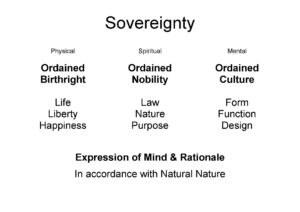Introduction to Natural Law
Natural Law is everything to do with the principles and tendencies of natural-nature. This includes the balancing (karmic) forces, causes and effects of the cycles and seasons within absolute-nature. By absolute-nature we mean all-beings, all-places and all-things – also, all-space, all-matter and all-time. There are natural laws, natural natures and natural purposes to every living being, place and thing in existence. Nothing escapes natural law. The natural laws of nature are about governing the commercial interactions and Inherent Sovereignty of living entities and all elements of natural life in universal existence: plant life, animals, birds, fishes, etc. Not forgetting that natural law also governs the celestial bodies, universe orbs and luminaries (galaxies, star formations, suns and moons). Nothing escapes law!
Every man and woman individually speaking has a natural law-nature-purpose about their being. Your natural law is equal to your natural nature which is equal to your natural purpose. Thus: law=nature=purpose. The same principle applies for all plant life, animals, birds, fishes etc. You do not have to teach a tree how to be a tree. Correct? You do not send a tree to tree school to learn how to produce fruit. The tree is already in tune with its own Inherent Sovereignty, so it does what it does instinctively, automatically and naturally and in accordance with the repetitive cycles and seasons within its natural habitat. The same principle applies to all animals, birds, fishes and so forth. Similarly, you do not send a lion to lion school to learn how to be a lion. The lion is already in tune with its own Inherent Sovereignty, so it does what it does instinctively, automatically and naturally and in accordance with the repetitive cycles and seasons within its natural habitat. Taking the simplicity and explanation of the tree and the lion above, we can see that human beings ought to be no different.
The latter is important to comprehend, because, your Inherent Sovereignty is your ordained birthright (to life-liberty-happiness), your ordained nobility (regarding your law-nature-purpose) and your ordained culture (your being’s form-function-design).

Introduction to Common Law
The basis of the common law is actually commercial. Not necessarily in the conventional sense, but more so in the spiritual sense of what commerce is about. Commerce is about movement and communication. By movement and communication, we mean interactions or energy exchange between two points. A simple conversation between two sovereign individuals, for instance, is commercial in the event that there are exchanges in dialogue taking place.
To put common law into a more relative context, let us consider its merits from the basis of village life. In your personal hut you may have laws or rules about how you conduct your life within your personal space. And the other individuals within the village are considered to be doing the same within their own huts. But when everyone steps out into the communal areas, there has to be some common consensus as to what everyone agrees to be codes of conduct, morality and so on. This is done to avoid conflict of interests since everyone is generally entitled to their own self-determination in accordance with their natural law-nature-purpose. This common consensus is the basis of the common law.
This understanding can be expanded as follows. So, the village has its common law intact. But the neighbouring village 5 miles away has a slightly different culture and common law. In fact, all the neighbouring villages have their own mentality, customs and traditions. Therefore, in-between these villages must be a next level consensus and set of common laws. Makes sense? The consensus of these common laws would include guidelines for commerce and trade between the several villages too. It is not difficult therefore, to see how a Common Law doctrine would be developed for an entire country, that would be documented as Laws of the Land.
Introduction to Admiralty Law
Following on from the above expounding of the Common Law, Admiralty Law (originally) has to do with the governing of vessels upon the seas. i.e., commerce and trade between continents, nations across the seas and oceans, also known as maritime law. Whilst each nation has its own internal laws by virtue of their own state sovereignty, admiralty law allows for fairness of movement and communication across the seas.
But in modern commercial vernacular Admiralty Law is about: Localised Statutes, Legislations, Acts of Parliament, Corporate Policies and so on – and governing the communications and interactions of documentary legal entities, legal persons and corporations within specific jurisdictions. The common/admiralty law of today is known as the Uniform Commercial code (UCc), executed privately in 1952, and published publicly in 1963, as Public Law 88-243.
Visit our videos page and study all the posts, in particular ‘Sovereignty and its Relationship to the Uniform Commercial code (UCc).’
